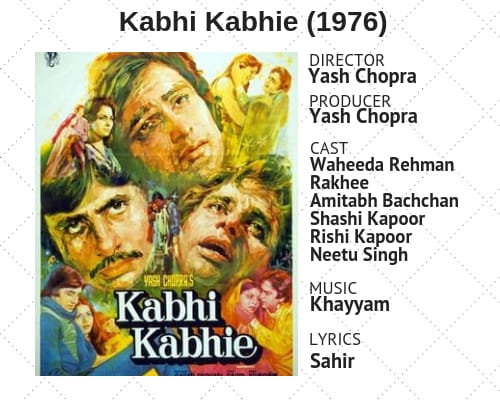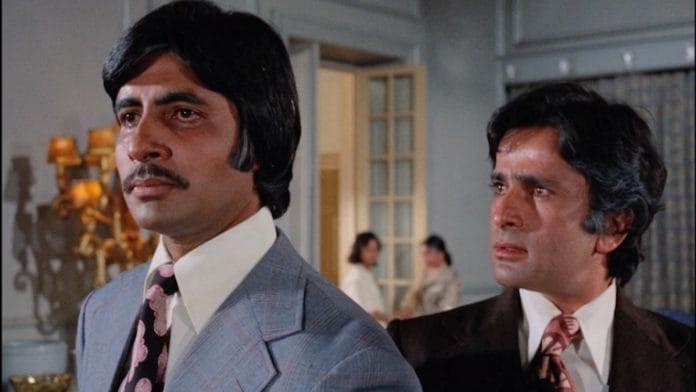In his 53-year-long career, filmmaker Yash Chopra had long associations with several colleagues, including actors Amitabh Bachchan and Shah Rukh Khan. But the longest and perhaps the most fruitful one was with lyricist Sahir Ludhianvi, or Sahir (as credited in Chopra’s films).
 For the director’s first film Dhool Ka Phool (1959), Sahir wrote the memorable ‘Tu Hindu Banega Na Musalman Banega’. And in their last film together, Kaala Patthar (1979), the lyricist signed off with ‘Ik Raasta Hai Zindagi’.
For the director’s first film Dhool Ka Phool (1959), Sahir wrote the memorable ‘Tu Hindu Banega Na Musalman Banega’. And in their last film together, Kaala Patthar (1979), the lyricist signed off with ‘Ik Raasta Hai Zindagi’.
In between came a lot of critical and commercial successes, like Waqt (1965) and Joshila (1973). Of those, one of the most iconic remains the 1976 multi-starrer romantic drama Kabhi Kabhie.
The lyricist’s 98th birth anniversary was celebrated this week.
Also read: Remembering Sahir Ludhianvi, the rare ‘poet’ among Bollywood lyricists
Yash Chopra had a penchant for crafting stories around complicated situations, creating drama that eschewed simplistic notions about human relationships.
Kabhi Kabhie, the starting point of which is believed to be a poem penned by Sahir, is about a face-off between the past and the present as seen through a collision of four lives over two generations. The story was credited to Yash Chopra’s wife Pamela.
Amit (Amitabh Bachchan), a young ‘shayar’ at an unnamed college in the picturesque mountains of Kashmir, falls in love with another student, Pooja (Rakhee). Amit wins her over with his poetry — the title track that originated from Sahir’s verses in the collection Talkhiyan.
A couple of lines in the song portend what the future holds for both.
“Main jaantaa hun ke tu gair hai magar yun hi…
Kabhi kabhi mere dil me khayaal aataa hai…”
The song appeared in multiple versions in the film’s soundtrack and won a Filmfare each for both the lyricist and the film’s music composer, Khayyam.
Their young love, then, is sacrificed on the pyres of parental approval.
Pooja gets married to Vijay (Shashi Kapoor) and gives in to marital bliss without much rebellion. Amit weds Anjali (Waheeda Rehman) and buries the simmering rage within himself.
Two decades later, the two couples come face to face through their kids, Vicky (Rishi Kapoor) and Pinky (Neetu Singh).
Chopra’s casting in Kabhi Kabhie evokes wonder even today. A year prior to this release, he had made Deewaar, in which Shashi Kapoor romanced Neetu Singh, then girlfriend of Rishi and later Kapoor family’s daughter-in-law. In Kabhi Kabhie, she played his prospective daughter-in-law. Both the films were shot almost simultaneously. Two years after Kabhi Kabhie, Rehman played Amitabh Bachchan’s mother in Chopra’s Trishul. Here, she played his wife.
(Chopra trumped this film’s star-show in 1981 with an even more dynamic cast in the extramarital affair-themed Silsila.)
Also read: Remembering Yash Chopra, a filmmaker who was more than just the ‘King of Romance’
Kabhi Kabhie’s simple plot finds gravity through the idea of a tainted past. Pinky, the young woman Vicky falls in love with, is the adopted kid of a family friend of Vijay (played by actors Simi Garewal and Parikshit Sahni in a brief ‘friendly appearance’). But she eventually finds out that she is the illegitimate child of Anjali from before her marriage to Amit.
Heartbroken to see her identity crumble in moments, Pinky sets out to meet her real mother. When she lands up at Anjali’s house in another town, she experiences a tension she hadn’t up until then in her life. Amit, now a construction baron, has given up poetry and allowed that void to be filled by his love for his daughter, Sweety (Naseem). When Pinky turns up, complications arise in his visibly strained relationship with Anjali.
Vicky, in pursuit of Pinky, also turns up at Anjali’s house and suddenly the two families with a shared past find themselves facing an uncomfortable present too.
In the film’s most popular scene, when Vijay finds out about Pooja’s relationship with Amit, he struggles initially to come to terms with the fact that a man his wife was once in love with stands next to him. Eventually, he makes peace with her “maazii” (past).
Chopra’s direction in the scene, aided greatly by Sagar Sarhadi’s dialogue, is remarkable in its empathy for the four characters at different junctures in their personal journey, and in holding a progressive outlook.
In a 2012 interview with Shah Rukh Khan ahead of the release of his last film Jab Tak Hai Jaan, Yash Chopra spoke of Kabhi Kabhie. “(It) is the most enjoyable film I have made in my life.”
Kabhi Kabhie was the first time Chopra worked with music director Khayyam. And the composer gave the filmmaker one of his most memorable albums, in a career already studded with several gems. Its highlight was most certainly Sahir’s poetry. Picturised on the popular young pair of Rishi Kapoor and Neetu Singh, a couple of Kishore Kumar and Lata Mangeshkar songs — ‘Tere Chehre Se’ and ‘Pyaar Kar Liya To’ — also worked very well with the audiences.
After Kaala Pathhar, Yash Chopra made 11 films. While he worked with greats like Gulzar, Anand Bakshi and Javed Akhtar (who started out as a lyricist with Silsila), only the latter two worked more than once with Chopra.
Sahir’s presence in Chopra’s films was more noticeable than other director-lyricist collaborations of the time. But that owed both to the heft of Sahir’s work and the ever-present lyrical quality in the themes of most of Chopra’s films. In Kabhi Kabhie, that presence was magnified more than ever before… or after.






